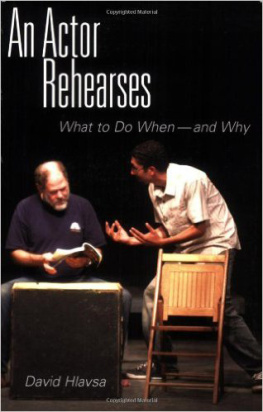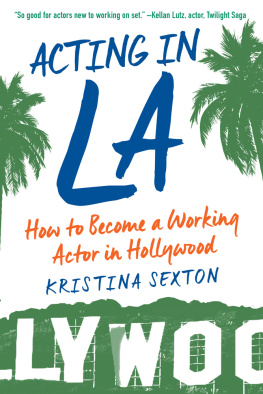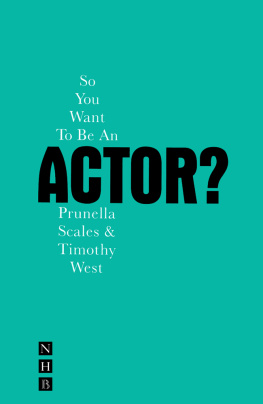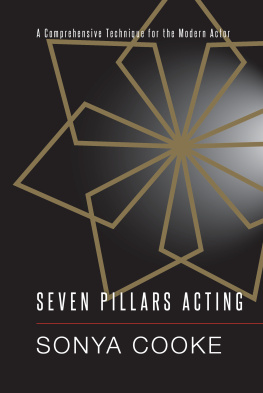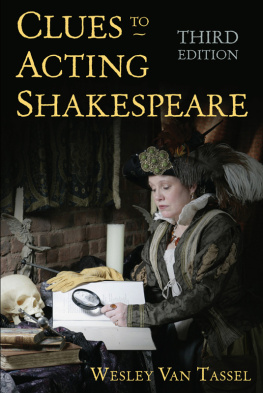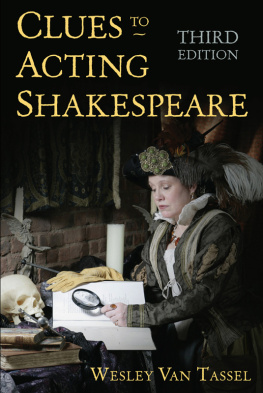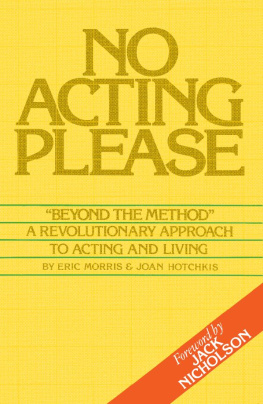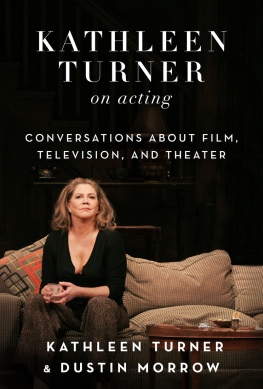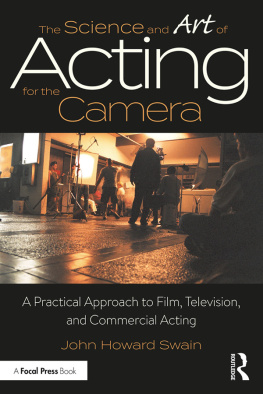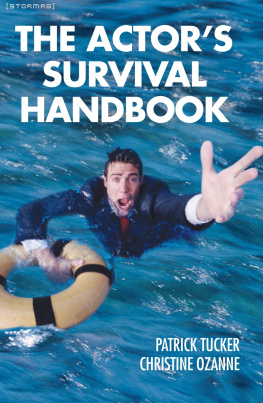Cover photo: Morten Rygaard
Cover design: Darius Vaikas
Acknowledgements
Many people have helped in many ways bringing this book about, and first and foremost, I would like to thank Nrgaards Hjskoles staff and students for giving me the opportunity to do what I think I do best! Furthermore, special thanks go to: Carsten Myllerup, Nanne Parbst, Claes Quaade, Kenneth Carmohn, Tobias Lund, Gro Therp of Art Cast, Lukas Lkken, Steen Herdel, Thomas Dalmo, Kristian Fjord, FFD, Jesper Zuschlag, Ida Cecilie Kildeberg Jrs, Anne Brix, Therese Helga Emborg, Mads Klougart, and Rasmus Gissel (the Kaffir Buffalo of Proof-Reading!)
Testimonials
For full testimonials go to the final pages or
facebook.com/thegenerousactor
Over the years I have sharpened my own approach, and of course reflected a lot on the subject only to realize that this book in a broad sense explains exactly how I work now. To read so concrete and detailed a presentation of what feels like my own, private approach was indeed very interesting and rewarding.
- Claes Quaade, actor and Danish Academy Award Nominee
There are many ways to enter the world of acting. The Generous Actor is a great and useful tool to opening the door and entering that magical world.
- Carsten Myllerup, director of film and television, founder of the Super 16 film school
Jesper has a profound understanding of the core of acting and has used his knowledge and abilities to create a well-structured course, which despite our different approaches complements my work at The National Danish Film Acting Academy really well. I hereby recommend this book to anyone interested in acting and film!
- Kenneth Carmohn, actor, acting coach, founder of Carmohn Technique and The National Danish Film Acting Academy
Working with Trier has taught me that the path to good acting leads through myself. Trier has created an approach which really embraces and supports the actor in his or her training. I give The Generous Actor my strongest recommendations!
- Kristian Fjord, actor and acting coach
It is my impression, that his book could be very significant in shaping the standard view on film acting, and I hope that it will reach a wide audience among acting students and professionals alike.
- Steen Herdel, producer and director
Do we really need another book on acting, when it doesnt even present us with a new method? Well, maybe that is exactly what we need: A non-method that avoids the restraining rules of technique and liberates the artistic creativity of the individual.
- Jesper Zuschlag, actor and acting coach
I would call (Triers approach, red.), no bullshit acting. If you need to do this or that to act well, by all means do it. But if you dont, then dont and lets work and enjoy it, no matter whether its comedy, action, or heavy, hardcore realism. () Despite his long experience and in-depth knowledge of acting theory and training, he still has an enthusiasm which sweeps you away and makes you want to have fun while doing your best. And its all here in this book.
For Asta, Magnus, Marie,
and Katrine!
Preface
Its Just Fucking Around
As acting teachers we find ourselves facing a classroom with a bunch of actors longing for us to help them realize a dream. These actors are entitled to the same amount of attention and training, which we of course strive to provide. The problem here is that acting training almost cannot exist without people working in pairs. And even if we tell them and ourselves that 'it's good training to watch others work', even the most dedicated actors sometimes find it hard to concentrate through a long session of watching pairs working on scenes.
Another issue is that if we really wish to be good at our jobs, we can't help but try to find a way to train our actors in some clever way where we do something which is not acting, but which somehow makes them better at the things actors do when they act. So, what do actors do? Well, they speak, they move, they feel, they listen, they prepare, they understand, and they react. But does this mean that we can simply devise a heap of exercises focusing on each of these actions individually? It is a tempting thought. And doing it makes us feel competent because it satisfies our desire to sound like we know about acting. Actors also love it because it makes them feel like they are really learning something by having the craft broken down into these essential parts.
But, and yes, there is a 'but', it simply does not work that way; at least not for me. I did all of the above in the beginning. And it worked too, in the sense that my actors were really happy. It just turned out that I was not. It actually made me miserable. In the beginning, I could not understand why. I had happy actors and great feedback, so there really was nothing to complain about. Until I realized that, as an actor, I would never do what I taught my actors to do.
My own acting was developed on stage or in front of a camera, not through tuition, and I started teaching without ever having been taught myself. Out of a sheer desire to do well, I bought the main books in circulation at the time and set to work. The material was mostly modern variations on Stanislavsky, and it felt great to dive into all the academic speculations and hands-on tools and feel how I learned all these new things and how I grew as a teacher. I became more serious and more conscious about the different elements of character analysis. It tickled my knack for academic thinking (developed through my literature studies and teaching at the university) to be using these skills for acting. I felt professional. I was able to do something which I could teach others.
The actors loved it. They showed up all eager to learn, and with my hands-on analytical approach I soon turned them into serious aspiring professionals. They did the exercises. They learned how to take notes on intonation and pauses etc. and the feeling of mastering acting by gaining control is extremely gratifying to both actors and teachers. Especially if they want to reassure themselves that they are learning something. When their parents asked them what they had learned, they could talk about all the different tools and the parents could nod and feel reassured that their kids acting dreams were being seen to in a constructive manner.
But, like I said, I started feeling miserable and in the beginning I couldnt figure out why. As I watched my actors happily gaining control, I would smile and compliment them, but I grew more and more sick to the stomach. It actually came to the point where I went to my boss and asked her to find another teacher because I felt something to be amiss. She told me to calm down and mentioned my excellent actor feed-back, so I stuck with it. Out of sheer desperation I turned to amazon.com where I looked up acting. I still have no clue why I decided on Guskins How to Stop Acting. Perhaps something in the title signaled a departure from the work I was doing but the fact remains that I bought that book, and only that book.
When it arrived, I started reading immediately. And already after a page or two I felt more at home and alive than I had ever done in all my professional life as an acting coach. I knew right there that this was what I wanted to teach. Here was a guy saying all the opposite things of what I was doing in classes and it instantly resonated with me. I turned page after page knowing that each line would be wonderful. I ran to the kitchen and told my wife that I had to change everything. She of course looked at me the way wives do when their husbands are clearly out of balance and told me to calm down, which I tried. But I knew then that this was it for me. Guskin had pulled me out of the hole I had been digging for myself and shown me my way.
Next page

